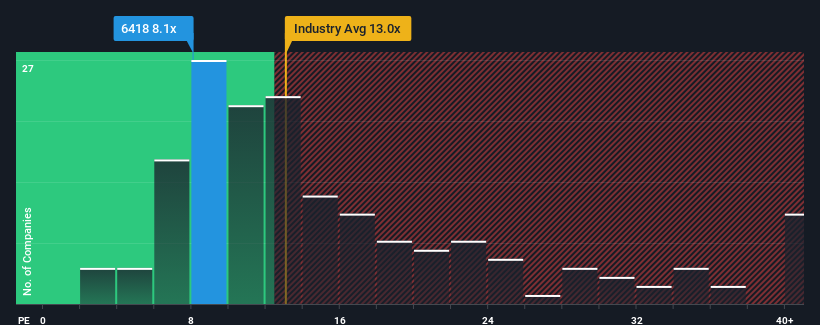- Japan
- /
- Electronic Equipment and Components
- /
- TSE:6418
Japan Cash Machine Co., Ltd. (TSE:6418) Not Doing Enough For Some Investors As Its Shares Slump 26%

Japan Cash Machine Co., Ltd. (TSE:6418) shareholders that were waiting for something to happen have been dealt a blow with a 26% share price drop in the last month. Instead of being rewarded, shareholders who have already held through the last twelve months are now sitting on a 13% share price drop.
Even after such a large drop in price, given about half the companies in Japan have price-to-earnings ratios (or "P/E's") above 15x, you may still consider Japan Cash Machine as an attractive investment with its 8.1x P/E ratio. However, the P/E might be low for a reason and it requires further investigation to determine if it's justified.
The recent earnings growth at Japan Cash Machine would have to be considered satisfactory if not spectacular. One possibility is that the P/E is low because investors think this good earnings growth might actually underperform the broader market in the near future. If that doesn't eventuate, then existing shareholders may have reason to be optimistic about the future direction of the share price.
Check out our latest analysis for Japan Cash Machine

What Are Growth Metrics Telling Us About The Low P/E?
There's an inherent assumption that a company should underperform the market for P/E ratios like Japan Cash Machine's to be considered reasonable.
Taking a look back first, we see that the company managed to grow earnings per share by a handy 5.9% last year. However, due to its less than impressive performance prior to this period, EPS growth is practically non-existent over the last three years overall. Therefore, it's fair to say that earnings growth has been inconsistent recently for the company.
This is in contrast to the rest of the market, which is expected to grow by 9.7% over the next year, materially higher than the company's recent medium-term annualised growth rates.
In light of this, it's understandable that Japan Cash Machine's P/E sits below the majority of other companies. Apparently many shareholders weren't comfortable holding on to something they believe will continue to trail the bourse.
What We Can Learn From Japan Cash Machine's P/E?
The softening of Japan Cash Machine's shares means its P/E is now sitting at a pretty low level. We'd say the price-to-earnings ratio's power isn't primarily as a valuation instrument but rather to gauge current investor sentiment and future expectations.
We've established that Japan Cash Machine maintains its low P/E on the weakness of its recent three-year growth being lower than the wider market forecast, as expected. Right now shareholders are accepting the low P/E as they concede future earnings probably won't provide any pleasant surprises. If recent medium-term earnings trends continue, it's hard to see the share price rising strongly in the near future under these circumstances.
And what about other risks? Every company has them, and we've spotted 2 warning signs for Japan Cash Machine (of which 1 is a bit concerning!) you should know about.
It's important to make sure you look for a great company, not just the first idea you come across. So take a peek at this free list of interesting companies with strong recent earnings growth (and a low P/E).
New: Manage All Your Stock Portfolios in One Place
We've created the ultimate portfolio companion for stock investors, and it's free.
• Connect an unlimited number of Portfolios and see your total in one currency
• Be alerted to new Warning Signs or Risks via email or mobile
• Track the Fair Value of your stocks
Have feedback on this article? Concerned about the content? Get in touch with us directly. Alternatively, email editorial-team (at) simplywallst.com.
This article by Simply Wall St is general in nature. We provide commentary based on historical data and analyst forecasts only using an unbiased methodology and our articles are not intended to be financial advice. It does not constitute a recommendation to buy or sell any stock, and does not take account of your objectives, or your financial situation. We aim to bring you long-term focused analysis driven by fundamental data. Note that our analysis may not factor in the latest price-sensitive company announcements or qualitative material. Simply Wall St has no position in any stocks mentioned.
Have feedback on this article? Concerned about the content? Get in touch with us directly. Alternatively, email editorial-team@simplywallst.com
About TSE:6418
Japan Cash Machine
Develops, manufactures, and sells money-handling and amusement center machines in Japan and internationally.
Excellent balance sheet established dividend payer.
Similar Companies
Market Insights
Community Narratives



